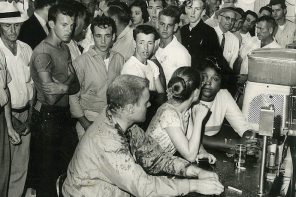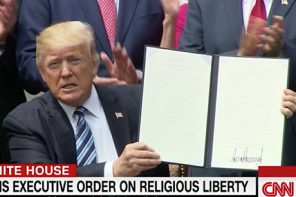At year’s end I have been checking in with some colleagues here and there—some of the very same folks in regional and national religious leadership who, six months ago, would cover their ears with their hands to shut out any criticism of the 44th president. They did not want to hear that he was too close to the Wall Street types to make them do right by their Main Street victims or to push through a regulatory regime that could forestall future meltdowns and bar predatory practices. They did not want to hear that Obama’s policies on detention and torture were not going to be all that different from his predecessor’s. And they absolutely did not want to hear that by cutting an absurdly generous deal with Big Pharma back in July (a deal that became public in August), Obama was already signaling that he would let industry players write the final health care legislation in ways that end up enhancing their power and profits.
I was tough on Obama back then—here on RD and in other contexts. So tough, in fact, that some members of my organization’s board of directors even asked me to dial it down. I should be giving the new guy a chance, they said, because the Republicans and the Loony Right were sure not going to give him one. In my defense I argued that it is not Obama the person I object to at all but rather the vise grip of money and militarism upon the Democratic Establishment. If there were a personal edge to my critique, it had to do with the fact that President Obama seems entirely disinclined to use the presidential bully pulpit to mobilize the people against entrenched money interests in the manner of FDR. For someone with his brilliance and his oratorical gifts to miss such an opportunity is just a bloody shame: that was the burden of my personal lament. In this respect I, too, allowed my hopes for the young new chief executive to override my realism about the core of his political identity and about how politics is really played these days.
But honeymoons, even for dewy-eyed liberals, have a short half-life. Maybe it was the Nobel speech and the Afghanistan surge. Maybe it was the pitiful wrist slap given to the big bankers—a “woodshed” experience deftly avoided by the bosses at Goldman, Morgan, and Citi, due, allegedly, to Eastern seaboard fog (metaphor, anyone?)—on the very same day that White House operatives were actively working to water down new banking regulation in the House of Representatives. Or maybe it is growing recognition of the shocking extent of the health care giveaways to the medical-industrial complex and to anti-abortion zealots.
Whatever it is, the screw has certainly turned. Now I am hearing/seeing religious progressives cluck and shake their heads like so many disoriented barnyard chickens. And the gist of their clucking is that Obama is such a disappointment! From Savior of the Nation just a few months ago to such a disappointment: that is how liberals (and here I mean mainly white liberals) do their traditional shuffle from a blind, love-struck optimism over a glamorous presidential candidate to an equally blind disenchantment over a failing/flailing president. When will religious liberals figure out that winning political personalities and pretty candidate faces are mere epiphenomena—that the Great Game is actually being played behind the scenes by folks without winning personalities and without pretty faces but with some very thick bankrolls?
Mobilized Money: The Real Superpower in Today’s Power Politics
During the Senate’s weary pre-Christmas vigil (running out the clock on last-ditch GOP efforts to block final passage) I heard Harry Reid drag out the old chestnut about politics being the “art of the possible”—and I smiled yet again that anyone would imagine the workings of Congress today conforming in any way to what was once taught in 9th grade civics class. For what is “possible” now is not a finely-tuned melding of various good ideas representing different viewpoints on how tackle public policy challenges. Not even close. As no other legislative spectacle demonstrates quite so well as the health care “debate,” the overwhelming driver of policymaking now is mobilized money. Nothing else even comes close: not good ideas, not constituency support, nothing.
What does it tell you when 13—yup, count ’em, 13—of Max Baucus’s former aides end up lobbying their former boss for the health insurance industry? What does it say when, by the time this thing is done, the main corporate stakeholders in health care will have dumped around $2 billion (in lobbying expenses, campaign contributions, special favors to legislators) into ensuring that the final legislation: (a) does not control costs or restrain health care profits, and (b) does not really move the country toward better health care outcomes (although these may yet come in a more or less willy-nilly fashion)? And this staggering sum does not even take into account the additional hundreds of millions the industry will put into state-level efforts to thwart effective reform.
This is why I was sure I had walked right through the looking glass when I came across a press statement from Jim Winkler, the lead lobbyist for the United Methodist denomination, saying we should all get behind the final push on the Senate side as a way of standing up to big insurance companies. Here is Winkler’s quote from a press event held at the Capitol on Dec. 15:
Authentic health care reform has been delayed by insurance companies seeking to protect vast profits and grotesquely inflated executive salaries. Health care is a human right. It cannot and should not be denied in favor of profit. Now is the moment of decision. Now is the time for moral courage in the face of money and power.
I like Jim Winkler, but did no one bother to tell him that the Senate bill he was rallying behind reflects the exact opposite of moral courage in the face of money and power? That the Senate bill was and is a colossal grab-bag of policy and financial giveaways to the insurance companies, whose share prices were perking up nicely at the very moment of Winkler’s press event? We can easily count some of the main goodies under Big Insurance’s Christmas tree: the companies won’t have to compete with a public option, they won’t have to compete with Medicare for the 54-and-up set, they still get to keep their special exemption from anti-trust laws, AND they will get 30-some million new and mostly healthy customers handed to them on a silver platter. Yes, they will be forced to spend 80-85% of premium dollars on actual health care services, but that is not exactly an onerous requirement—and they perfectly well know, as Wall Street investors know. So were these companies truly worried about this legislation? I somehow doubt it.
Sober Up, People!
It may be in the nature of the work these days for politicians to pin a bright shiny ribbon on something pretty awful and say it reflects “moral courage.” But when progressive religious leaders engage in the same kind of misdirection we have a serious problem. Such leaders are welcome to make the case—as many have—that the overall public interest will be served by enacting what Democrats are still pleased to call health care “reform” despite every last craven sacrifice of principle and despite every last dripping slice of pork handed out to this senator and that representative, to this lobbyist and that campaign contributor.
I don’t mind if their honest position is that the legislation should pass. I myself think it should pass. But I do mind very much if they describe such a smelly and corruption-laden legislative product as unalloyed glad tidings for the uninsured and underinsured—or as some kind of historic vindication of popular sovereignty in America. Again, spinning it that way is what politicians do—and we all saw the president doing just that before Christmas, even going out of his way to chastise “the Left” for whining about what the Senate bill leaves out—but it is revolting to see religious leaders doing it.
Responsible religious leaders need to stay sober and stop cheerleading for the Democrats and for the Obama White House team just because they’re not total Visigoths.
How will everyday people know that their pockets are being picked if religious leaders join the corporate media and the politicians in dancing to the daily minuet of obfuscation and spin? How will everyday people finally begin to push back against mobilized money unless clergy and theologians and faith leaders of every description are willing to lift the veil on the extent to which Congressional votes are sold off to the highest bidder each and every day?
Yes, it’s true that, back during the bad old George W. Bush Administration, industry lobbyists did indeed write a good bit of the legislation that Republican members introduced and pushed through Congress. Does anyone seriously imagine that it’s all that different today, just because we now have Democrats attaching their names to the bills?
A friend actually gave me a good definition of the term “New Democrat” the other day: a “New Democrat” is someone who gets to corporate money faster—and gets more of it—than any Republican can do during the current Democrat-majority regime in Washington. And my friend’s definition is accurate: just take a look at where the leading House New Democrats (people like Melissa Bean of Illinois) get their money; it’s all in the public record.
Sobriety is not the same as cynicism. Cynics expect nothing to change, so they don’t even try. Sober people stay awake, stay focused, and keep a fine flame of indignation burning as they continue to struggle toward a different kind of future—one in which the people’s representatives might actually represent the people and not the corporate cash machine.




